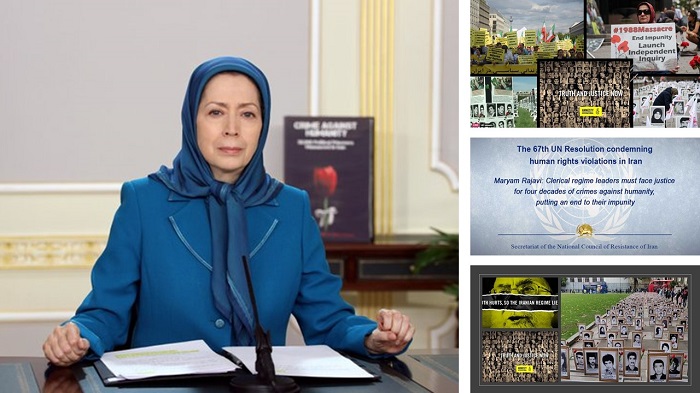
For the 67th time, the UN General Assembly passed a resolution on Wednesday condemning the Iranian regime because of its human rights violations.
As the President-elect of the main opposition organization, t the National Council of Resistance of Iran (NCRI), Mrs. Marya Rajavi, said after the resolution, which she welcomed: “the main perpetrators of the atrocities mentioned in this resolution are those who have been continuously involved in crimes against humanity during that past four decades, particularly the massacre of political prisoners in 1988, the brutal suppression of the November 2019 uprising that leftover 1,500 protesters killed, and 12,000 arrested.”
The Iranian people, the Resistance & the victims’ the loved ones demand the referral of the dossier on this crime to the UN Security Council and & international tribunal. The impunity of Khamenei and other regime officials must end. #NoImpunity4Mullahshttps://t.co/w1DTe9jB1a
— Maryam Rajavi (@Maryam_Rajavi) December 16, 2020
Reuters confirmed in a special report on December 23, 2019, about the deadly crackdown on November nationwide protests in Iran the death toll of 1500 that was announced by the People’s Mojahedin Organization of Iran (PMOI / MEK Iran) on December 15, 2019.
According to Mrs. Rajavi, the resolution was not as comprehensive as it could have been. It only covered some of the abuses committed by the regime, Mrs. Rajavi said.
An excerpt from the statement made at the UN General Assembly follows: The resolution is concerned “at the alarmingly high frequency of the imposition and carrying-out of the death penalty, [….] in violation of its international obligations, including executions undertaken against persons on the basis of forced confessions or for crimes that do not qualify as the most serious crimes, including crimes that are overly broad or vaguely defined, in violation of the International Covenant on Civil and Political Rights [….] the continued imposition of the death penalty against minors [….] in violation of the Convention on the Rights of the Child.”
While welcoming the adoption of the 67th UN resolution condemning #HumanRights violations in #Iran, I reiterate that the clerical regime’s leaders must face justice for 4 decades of crimes against humanity, and their immunity must end. #NoImpunity4Mullahshttps://t.co/rJ8mQGfNnI pic.twitter.com/sTDUbr0L0Z
— Maryam Rajavi (@Maryam_Rajavi) December 16, 2020
Concern was also expressed over the use of “torture and other ill-treatment or unjust, inhuman and humiliating punishments [….] including sexual assaults and punishments that are severely unlevel to the context of the crime [….] and the commitments and international norms, including the UN minimum standard laws in treating the prisoners.”
The resolution also called for the release of all political prisoners arrested during the protests in November 2019 and January 2020 and voiced alarm at “the widespread and systematic use of arbitrary arrests and detention [….] the use of torture to extract confessions, such as in the case of Navid Afkari and others, and cases of suspicious deaths in custody, as well as long-standing violations involving the Iranian judiciary and security agencies, including enforced disappearances and extrajudicial executions, …. and suppression of “the right to freedom of expression and opinion, including widespread restrictions on Internet access and in digital contexts, and the right to freedom of association and peaceful assembly” and…. “harassment, intimidation and persecution of political opponents, human rights defenders, and “all forms of discrimination and other human rights violations against women and girls in law and in practice.”
#NavidAfkari said in one of his last messages that he is fighting against the most ruthless adversary in human history.And there is no doubt that it will be toppled as a result of the struggle &uprisings of the courageous youths and the great Army of Freedom #StopExecutionsinIran pic.twitter.com/ilmMuXxnue
— Maryam Rajavi (@Maryam_Rajavi) September 19, 2020
The resolution isn’t the only public condemnation of the Iranian regime made recently. A letter compiled and signed by several UN human rights experts was released just before the UN General Assembly resolution raised concern about the continued human rights abuses in Iran, including the cover-up of the massacre of 30,000 political prisoners in 1988, mainly members or supporters of the People’s Mojahedin Organization (PMOI / MEK Iran) of Iran’s main opposition group.
“There is systemic impunity enjoyed by those who ordered and carried out the extrajudicial executions and enforced disappearances. To date, no official in Iran has been brought to justice and many of the officials involved continue to hold positions of power including key judicial, prosecutorial and governmental bodies responsible for ensuring the victims receive justice,” warned the experts. “We will call on the international community to take action to investigate the cases including through the establishment of an international investigation,” if the regime fails to uphold commitments under international law.
The regime has been given 60 days to respond to the letter of concern.
and People’s Mojahedin Organization of Iran – MEK IRAN – YouTube







